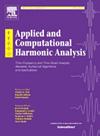An efficient spatial discretization of spans of multivariate Chebyshev polynomials
IF 3.2
2区 数学
Q1 MATHEMATICS, APPLIED
引用次数: 0
Abstract
For an arbitrary given span of high dimensional multivariate Chebyshev polynomials, an approach to construct spatial discretizations is presented, i.e., the construction of a sampling set that allows for the unique reconstruction of each polynomial of this span.
The approach presented here combines three different types of efficiency. First, the construction of a spatial discretization should be computationally efficient with respect to the dimension of the span of the Chebyshev polynomials. Second, the constructed discretization should be sample efficient, i.e., the number of sampling nodes within the constructed discretization should be reasonably low. Third, there should be an efficient algorithm for the unique reconstruction of a polynomial from given sampling values at the sampling nodes of the discretization.
The first two mentioned types of efficiency are also present in constructions based on random sampling nodes, but the lack of structure here causes the inefficiency of the reconstruction method. Our approach uses a combination of cosine transformed rank-1 lattices whose structure allows for applications of univariate fast Fourier transforms for the reconstruction algorithm and is thus a priori efficiently realizable.
Besides the theoretical estimates of numbers of sampling nodes and failure probabilities due to a random draw of the used lattices, we present several improvements of the basic design approach that significantly increases its practical applicability. Numerical tests, which discretize spans of multivariate Chebyshev polynomials depending on up to more than 50 spatial variables, corroborate the theoretical results and the significance of the improvements.
多元切比雪夫多项式跨度的有效空间离散化
对于任意给定的高维多变量切比雪夫多项式跨度,本文提出了一种构建空间离散化的方法,即构建一个采样集,允许对该跨度中的每个多项式进行唯一重建。首先,就切比雪夫多项式的跨度而言,空间离散化的构建应具有计算效率。其次,构建的离散化应该具有采样效率,即构建的离散化中采样节点的数量应该合理地减少。第三,在离散化的采样节点上,应该有一种高效的算法来根据给定的采样值重建多项式。上述前两种效率也存在于基于随机采样节点的构造中,但由于缺乏结构,导致重建方法效率低下。我们的方法使用余弦变换秩-1 网格的组合,其结构允许在重构算法中应用单变量快速傅里叶变换,因此可以先验地高效实现。除了对采样节点数量和随机抽取所用网格导致的失败概率进行理论估算外,我们还介绍了基本设计方法的几项改进,这些改进大大提高了其实际应用性。通过对取决于多达 50 多个空间变量的多元切比雪夫多项式跨度进行离散化的数值测试,证实了理论结果和改进的重要性。
本文章由计算机程序翻译,如有差异,请以英文原文为准。
求助全文
约1分钟内获得全文
求助全文
来源期刊

Applied and Computational Harmonic Analysis
物理-物理:数学物理
CiteScore
5.40
自引率
4.00%
发文量
67
审稿时长
22.9 weeks
期刊介绍:
Applied and Computational Harmonic Analysis (ACHA) is an interdisciplinary journal that publishes high-quality papers in all areas of mathematical sciences related to the applied and computational aspects of harmonic analysis, with special emphasis on innovative theoretical development, methods, and algorithms, for information processing, manipulation, understanding, and so forth. The objectives of the journal are to chronicle the important publications in the rapidly growing field of data representation and analysis, to stimulate research in relevant interdisciplinary areas, and to provide a common link among mathematical, physical, and life scientists, as well as engineers.
 求助内容:
求助内容: 应助结果提醒方式:
应助结果提醒方式:


